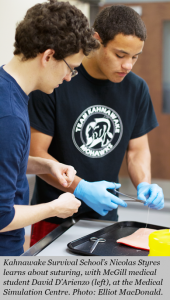Adapted from story written by Stephen Lalla, Faculty of Education As part of opening discussions regarding a new Indigenous educational initiative, representatives from McGill’s Faculties of Medicine and Education met with First Nations and Inuit educators, health professionals and Indigenous partners of the McGill RUIS (Réseau Universitaire Intégré de Santé) and OFNIE (Office of First Nations, Inuit Education)on April 18 and 19.
As part of opening discussions regarding a new Indigenous educational initiative, representatives from McGill’s Faculties of Medicine and Education met with First Nations and Inuit educators, health professionals and Indigenous partners of the McGill RUIS (Réseau Universitaire Intégré de Santé) and OFNIE (Office of First Nations, Inuit Education)on April 18 and 19.
The two-day collaborative workshop asked participants to imagine how an Indigenous Summer Science Institute could be organized and sustained, with the goal of supporting the science foundations of Indigenous youth in the Secondary I/II levels and ultimately increasing the number of needed Indigenous health care professionals in Quebec.
Contributors from McGill’s academic ranks included Dr. Kent Saylor and Dr. Richard Menzies, co-chairs of the Faculty of Medicine’s Indigenous Health Professional Training initiative, as well as Professors Elizabeth Wood, Steven Jordan; Jim Howden, Director of the Office of First Nations and Inuit Education; Dean of Medicine Dr. David Eidelman; and Dean of Education Dr. Dilson Rassier.
Through its work in the communities that comprise the RUIS McGill network to its inclusion in the undergraduate medical curriculum for students during all four years of medical school, Indigenous health holds an important place within the Faculty of Medicine. Existing initiatives foster the development of the knowledge and skills needed to promote culturally safe care for Indigenous patients through collaborative, hands-on teaching and provide medical students with an introduction to the history of colonization, Indigenous worldviews, traditional knowledge, holistic approaches to healing, and social determinants of health. However, the Indigenous Health Professional Training Initiative has been created to strengthen the Faculty’s efforts in recruiting and supporting Indigenous students in health professional training programs.
“The Indigenous Science Futures initiative is an important first-step in enhancing the science education to Indigenous youth, creating more opportunities for them to thrive in health care professions” said Dr. David Eidelman, Vice-Principal (Health Affairs) and Dean, Faculty of Medicine. “Through a combination of strategies, our goal is to inspire Indigenous youth to pursue studies in health sciences and become part of the next generation of physicians, dentists, nurses, occupational and physical therapists and speech-language pathologists.”
Launched in 2015, the Faculty of Education’s Science Futures initiative’s objective is to provide support for science education in local schools. Indigenous Science Futures is conceived as a focused initiative, aimed at developing Indigenous science pedagogy and culturally-relevant curricula for youth from Inuit, Mohawk, Cree, Naskapi, Algonquin and Mi’gmaq communities.
“Our goal is to support the science foundations of Indigenous learners in the Secondary One and Two levels by implementing a curriculum that is informed by Indigenous values,” explained Elizabeth Wood, Associate Dean of Academic Programs with McGill’s Faculty of Education.
Topics discussed included the integration of Indigenous worldviews, cultural traditions, language and methodologies in to the Quebec Education Program (QEP). Participants spoke about “Two-Eyed Seeing”, a concept developed by Mi’gmaq Elder Albert Marshall and defined as “learning to see from one eye with the strengths of Indigenous ways of knowing… and from the other eye with the strengths of Western ways of knowing…. and learning to use both of these eyes together, for the benefit of all.” Other subjects discussed included the potential use of creation stories, land-based practices, spirituality, and traditional medicines. A fundamental objective outlined by participants is to ensure continuity and sustainability of efforts, (i.e. mentorship, tutoring and shadowing experience) so that youth who attend will continue to have support in their academic careers during the program and the school year.
The two-day workshop functioned as an important building block in this collaborative process. In subsequent meetings McGill’s Faculties of Medicine and Education will unveil the long-term plans for the Indigenous Science Futures initiative and other McGill and community partners will be invited to participate as the initiative unfolds. Expected launch date of this initiative is set for Summer 2017.
April 29, 2016
